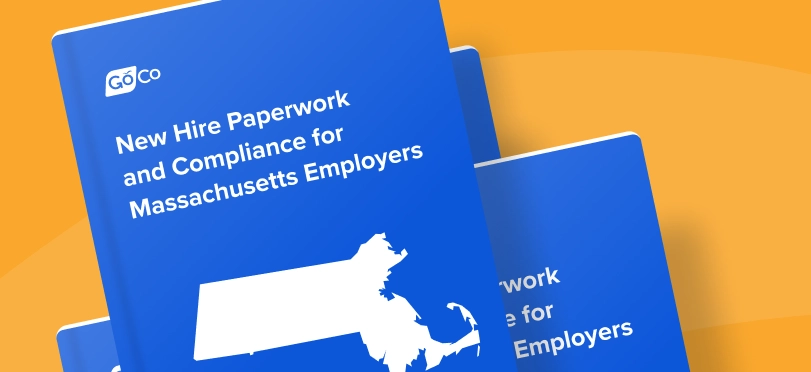
If you find new hire paperwork and compliance for Massachusetts confusing, here's a comprehensive guide to help you understand.
August 25th, 2023

Table of Contents
With a higher-than-average labor force participation rate of 63.4%, Massachusetts has an array of jobs for people seeking new work. Since each new hire comes with paperwork requirements to ensure compliance with state and federal laws, it's vital to understand new hire paperwork in Massachusetts.
Massachusetts has specific regulations that employers must follow when hiring new employees. Find out more about the essential new hire paperwork for Massachusetts employers below.
Employers in Massachusetts must complete Form I-9, Employment Eligibility Verification. The U.S. Citizenship and Immigration Services (USCIS) mandates this.
This essential form verifies the identity and employment eligibility of newly hired employees. It helps with ensuring that they have the authorization to work in the United States. Compliance with Form I-9 requirements is critical for employers to avoid potential penalties.
Form I-9 consists of three sections, each serving a specific purpose. Section 1 is the Employee Information and Attestation section. The employee must complete this section on or before their first day of work.
The employee provides their full legal name, date of birth, and other required details. Additionally, the employee must attest to their employment eligibility status.
They do this by selecting one of the appropriate citizenship or immigration status options. If applicable, they'll need to provide relevant documentation details.
Section 2 is the Employer or Authorized Representative Review and Verification section. The employer must review the employee's original documentation within three business days. They do this to verify their identity and employment eligibility.
Employees must present acceptable forms from the list of documents provided. The employer must examine the documents in the presence of the employee. They then complete the verification process by recording the document information in Section 2.
Section 3 is the Reverification and Rehires section. If applicable, this section will re-verify employment eligibility for employees with temporary work authorizations. It's also used for rehires within three years of the original Form I-9 date if the employee's work authorization has expired.
Employers must keep the forms for as long as the individual works for them. This is to ensure they can be updated if there are any changes.
After an employee's termination, Form I-9s must be retained for at least three years from the date of hire. Alternatively, they may be kept for one year from the termination date, whichever is later.
Proper storage and record-keeping are crucial for compliance. Employers may be subject to random audits by U.S. Immigration and Customs Enforcement (ICE).

Federal Form W-4, Employee's Withholding Certificate shows the amount of federal income tax to withhold from a paycheck. In Massachusetts, state income taxes are also withheld.
The information provided on Form W-4 comes from the employee's tax situation. This is to ensure accurate withholding. When hiring new employees, you'll need to ensure they have an accurate W-4.
Form M-4 gathers important information from employees. The form allows employees to claim exemptions. It also provides additional details that impact their state tax liabilities.
Accurate withholding ensures that employees have sufficient taxes withheld throughout the year. They, therefore, avoid unexpected tax burdens during tax filing season.
Employees must complete Form M-4 upon starting a new job or whenever there is a change in their tax situation. The form consists of several sections that employees need to fill out accurately to ensure proper withholding.
Employees provide their full legal name, Social Security number, and contact information on the form. They then indicate their filing status.
This may include single, married, head of household, or qualifying widow(er). The filing status selected will affect the tax rate used for withholding calculations.
In the next section, employees claim the number of allowances they are eligible for. Each allowance reduces the amount of income subject to withholding. This results in lower tax deductions from the paycheck.
Sometimes, employees might think they'll owe additional tax. For example, if they are receiving a second income. On Form M-4, they can specify how much should be withheld from each paycheck to cover any other obligations.
If an employee is a nonresident alien, they must complete Form M-4A. This is the Massachusetts Nonresident Alien Withholding Exemption Certificate. They must complete this form instead of Form M-4.
This form is for employees who are not U.S. citizens. It's also for those who are not permanent residents. This helps determine the appropriate tax withholding based on their nonresident status.
Employees should review their Form M-4 periodically. They must update it whenever there is a change in their financial or tax situation.
Life events such as marriage or changes in dependents may impact an employee's withholding status. Regular updates ensure that withholding remains accurate.
Employers must retain and maintain Form M-4 for all employees. If the forms require updating, employers should do this promptly. Otherwise, the income tax withholding information might be incorrect.
Massachusetts has its own set of wage and hour laws that employers must follow. This includes ensuring that employees receive at least the state minimum wage, higher than the federal minimum wage. Employees must also get overtime for hours worked beyond the standard 40-hour workweek.
Employers must offer employees proper meals and rest breaks as required by state law. Following these regulations is good for everyone.
Massachusetts law mandates that employers carry workers' compensation insurance. This is to provide benefits to employees who suffer work-related injuries or illnesses.
Employers must inform new hires about their workers' compensation coverage and rights. They should provide them with the Employee's Rights and Responsibilities pamphlet. This contains lots of useful information.
PFML stands for Paid Family and Medical Leave. The PFML program in Massachusetts offers paid leave for several qualifying reasons, which include:
Employees can take time off to care for a family member with a health condition. They can also get leave to bond with a new child. This includes fostered and adopted children.
Employees may use PFML for any serious health conditions. If they require medical treatment or cause them to be unable to work, they can request time off.
PFML can be used by eligible family members of a covered service member. This is so they can manage certain affairs related to military deployment.
Eligible employees can take leave to care for a covered service member who has a serious injury or is ill. The injury does not need to have happened while the service member was on active duty.
Eligibility for PFML is based on an employee's earnings and the duration of their employment. To be eligible for PFML benefits, an employee must have earned a minimum amount of wages during the "base period". They must also be actively employed or have a qualifying reason for leave.
The duration of PFML benefits varies depending on the type of leave taken. For example, an eligible employee can receive up to 20 weeks of paid leave for medical leave.
As an employer in Massachusetts, you are responsible for contributing to the PFML program. Employers must remit contributions on behalf of eligible employees. The contribution rate is set by the state and is subject to periodic changes.
Employers must inform their employees about their rights under the PFML program. This includes providing written notices to employees about the program's benefits. They also need to tell them about contribution rates.
Employers must also put up posters with information about PFML around the workplace. This means all employees can see information about it.
Employees taking PFML must apply through the Department of Family and Medical Leave. They will need to provide all relevant information. This includes their reason for leaving and supporting documents.
Under the PFML program, eligible employees who take leave have job protection. Employers must reinstate employees to their previous positions. They must offer the same pay when they return from leave.
Additionally, employers must continue to provide employees with any health benefits they receive. This ensures the PFML employees are getting what they're entitled to.
Massachusetts employers must know the laws related to Equal Employment. Opportunities (EEO). This act prohibits discrimination based on protected characteristics. These include race, sex, religion, and disability.
Ensuring your workforce is free from discrimination means a better working environment. The hiring process must also be free from discrimination. As an employer, you must consider a wide range of candidates.

All newly hired employees must be reported to the state by their employer within 14 days of their start date. This can be completed online or via mail or fax.
Being familiar with new hire paperwork and compliance in Massachusetts is vital for employees and employers. By understanding and adhering to the essential forms, employers can ensure a smooth onboarding process.
Stay organized and on top of any updates with GoCo's top-rated all-in-one HRIS software. To see how GoCo can help you with onboarding and more, take a free tour today!
Subscribe to Beyond The Desk to get insights, important dates, and a healthy dose of HR fun straight to your inbox.